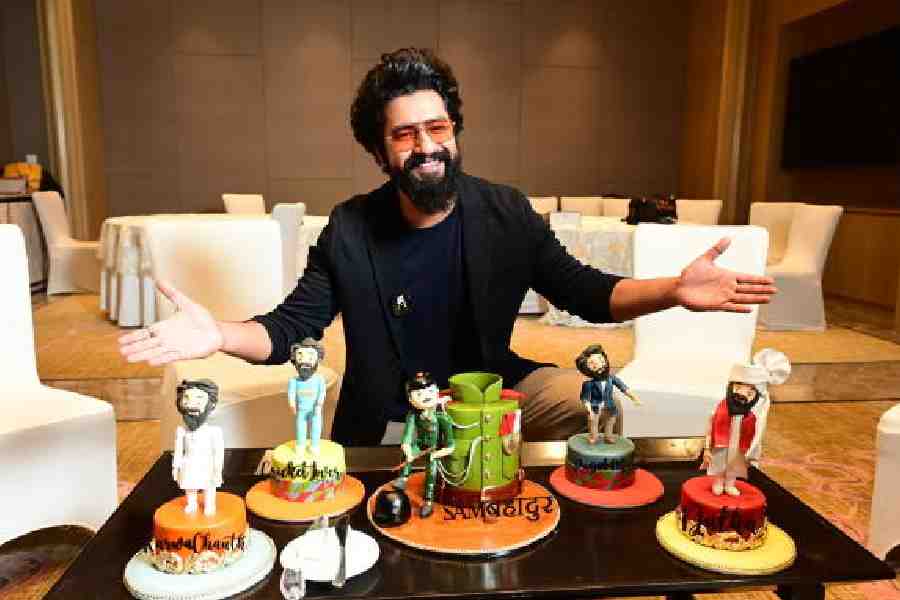‘FriYay’ was the mood and the ‘josh’ was on full display when Vicky Kaushal met Team t2 for an exclusive chat. In Calcutta to promote his upcoming film Sam Bahadur — that peeks into the mind of legendary Army man Sam Manekshaw and traces the heroics of the man often regarded as “India’s Greatest Soldier” — Vicky (whose filmography of just eight years already boasts stunners like Masaan, Raazi, Sardar Udham and Uri) was his usual warm and affable self, taking us through the mind and heart of ‘Sam Bahadur’, why the film is his “toughest” till date, what the support of his family means to him and what a chill day with wife Katrina Kaif looks like.
Before we sat down for the tete-a-tete at ITC Royal Bengal, in true t2 tradition, there were a host of cakes, courtesy Little Pleasures Patisserie. While one cake had a figure replica of Vicky as Sam Manekshaw in the December 1 release, the others represented the various aspects and avatars of his life. “Thank you! It’s lovely to start the day on such a sweet note,” smiled Vicky, sporting glares, a full beard and dressed in casuals.
Priyanka Roy: Welcome back! You shot a portion of Sam Bahadur in Calcutta, you came here for the Durand Cup and now you are starting your promotions for Sam Bahadur from our city. Have you discovered anything new about Calcutta during your recent trips here?
Vicky Kaushal: In the last one year, I have been to Calcutta the most number of times than I had ever been in the past. I love coming to Calcutta. I love the food, but unfortunately, I will not be able to indulge this time. I could indulge myself during the shoot of Sam Bahadur, though. I love coming here because of the culture and character of the city, the people are so sweet and cooperative. When I was shooting and came for the Durand Cup, they welcomed me with hearts open and one does feel like coming here again and again.
There is no genre in mind, but I want to shoot a film here when it is raining. There is something romantic about Calcutta rains. There is an old-school vibe and nostalgia...Priyanka: Maybe a football film in the rain?Vicky: Yes, that would be fantastic! So next time you will have to make a football cake as well!Priyanka: What did you indulge in the most here when you shot for Sam Bahadur?Vicky: Biryani and chaanp. And my most favourite ice-cream flavour in the world is nolen gur.
Farah Khatoon: You have really perfected the body language and mannerisms of Sam Manekshaw. What kind of effort went into that, especially that particular way of speaking and the lean-forward gait?
Vicky: There was a lot of R&D (research and development) that went into it. When Meghna (Gulzar, director) and I sat to prep for the part, we decided to start from scratch. I had heard stories from my parents, from Meghna and had read the script, but I was like, let me empty this vessel and start with: ‘I don’t know anything’, and now let’s fill it up, step by step, brick by brick.
We would meet up every day and jam on the script. We would watch his interviews, read books on him, google his story, meet his family... I spent time with Sam Manekshaw’s daughter and grandson. There were a lot of anecdotes from them. The tricky part was that all the interviews Manekshaw had given was after he had retired, when he was 75-80 years old. But I had to play him in the age group of 20-60.
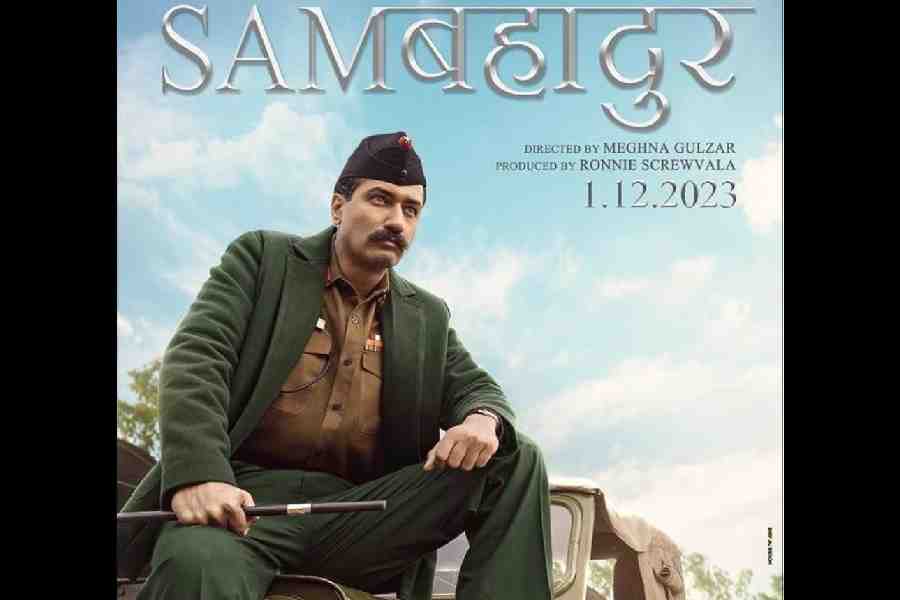
Vickay Kaushal as Field Marshal Sam Manekshaw in Sam Bahadur
Pramita Ghosh: So what were your references for his young age?
Vicky: We kept watching his interviews again and again. I wrote down what he was saying as a script and then I would try and talk like him. It started with trying to mimic him. Then I started the process of decoding him, as in how he would talk if he was 40 years or 50 years younger than that. We had a dialect coach and Meghna and everyone would jam in the room together and keep talking where it was very important for me to not sound like myself, not walk like myself and nothing had to look or feel like Vicky Kaushal.
I would just keep walking in the office and try and get that walk right like him and whenever Meghna would feel like I am sounding like myself, we would mark those words and letters. He had a very Anglicised way of speaking, a sort of a British-clipped accent. But because this is a Hindi film, we couldn’t keep English dialogues throughout. So we had to decode it the way he would speak in Hindi.
It was a process of meeting and working like a musician and doing riyaaz every day so that it becomes second nature by the time we reach the set and focus on the emotions next. For an army film, the homework has to be strong and if it’s an army film based on Sam Manekshaw, you better come with your socks pulled and your ammunition ready.
MOODS AND MOMENTS
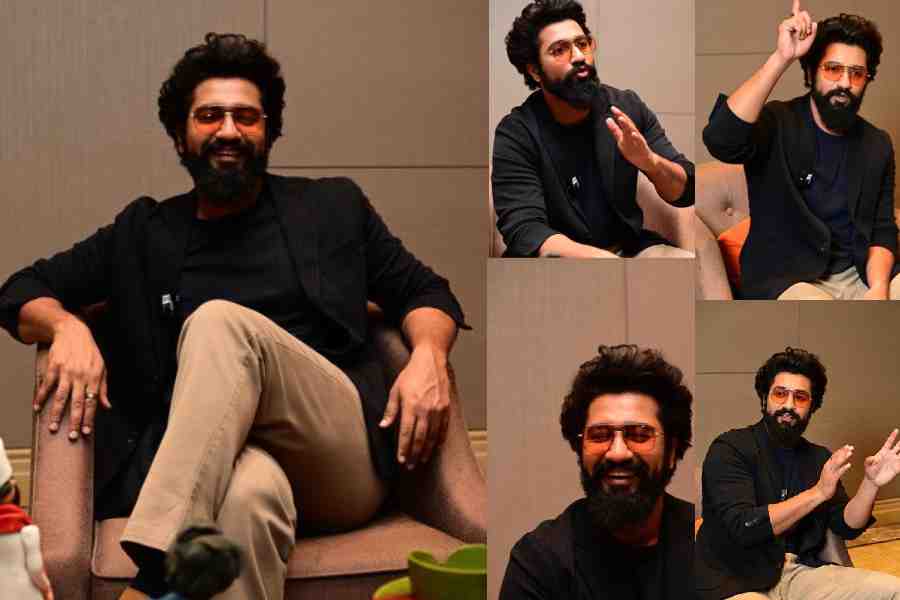
Vicky imitating Sam Manekshaw’s manner of sitting during the t2 chat
Priyanka: Did you start talking like that even off the set?
Vicky: With my body language, there was no pack-up. I realised it a little into the shoot that I had started walking like him. While we were shooting for Sam Bahadur, there was a gap and I had to shoot for a song for Zara Hatke Zara Bachke. Laxman sir (Utekar, director) would come to me and point at my posture and then I would realise that unconsciously I was walking like Sam Manekshaw even in Zara Hatke Zara Bachke! Sam had the habit of sitting with his legs crossed and even otherwise, I started sitting like that.
Farah: Though the two roles are different, did doing Uri, especially the training bit, help you in Sam Bahadur?
Vicky: There are a lot of things I experienced in Uri that came in handy and will come handy when I am part of any film that is based on the armed forces. Firstly, I got to know their character, the way they function, their etiquette and the conduct of a military personnel. During and after the shoot of Uri, I got to interact with a lot of army officials and that was a huge help. I got to know the hierarchy, designation and ranks, how a junior talks to a senior, what’s the code of conduct between each of them... so all the basics were cleared.
And then, of course, for Sam Bahadur, there was a different kind of research involved. This was not physical like Uri, which was an operation-based film. This was more about a man, his state of mind, his journey, his legacy, his glory, his character, clarity of thoughts, what made Sam the legend that he was.... In Uri, I was playing a major while in Sam Bahadur, I get to the rank of a Field Marshal. And that is like covering the entire army (hierarchy). I had to do a kind of textbook study of every rank — what were the duties of every rank, dos and don’ts, what is an army commander…. It was more theoretical study here while Uri was more practical and physical study.
Zeba Akhtar Ali: You have now done a few films based on the Army and built around patriotic fervour. Do you find yourself naturally drawn to such subjects?
Vicky: I think so. I am naturally drawn to subjects that depict homegrown heroes, heroes we had in our land, real heroes. The heroes which I feel the youth of every generation should be aware of. Only if they are aware of them can they celebrate them. Hollywood has Marvel superheroes but we have our own superheroes because our land has gone through so much conflict. There has been an evolution of India as a country because of what people have gone through.
I find it fascinating as an audience to see stories where I am educated and entertained about our heroes. And somewhere there is the thought that we are enjoying today because someone has paid a price for it, somebody had done something that two generations after them could reap the benefits of. As an audience, I feel drawn to watch those films and as an actor, I feel I am getting to do something meaningful.
Piya Roy: The film retells the story of a time in India’s history which is just about 50 years ago. Are there any lessons hidden in this story that you feel the audience of today must know?
Vicky: A character like Sam Manekshaw is timeless, those human values are timeless, the charm that he had, the humour, the wit, the courage, the strength... everything combined together made the man who he was.... In our first meeting, Meghna told me that they don’t make men like him anymore. Even now, there are so many moments when I get stuck somewhere and there is this thought: ‘What would Sam sir have done? How would he have reacted to a situation like this?’ He was known for his decision-making skills.
Priyanka: Sam Manekshaw did not brook any nonsense. He said it as it is and wasn’t scared to speak truth to power. Are you like him in any way?
Vicky: I wish I was (smiles). I am nowhere close to him. It is not about him being frank or calling a spade a spade, it was about doing it in a way that would still floor the person at the receiving end of it. Even when he was harsh, there was a certain gravitas and wit... to the extent that you got the point but you were not offended by it.
Also, now having interacted with the Parsi community, I feel it’s a very Parsi thing. That wit and humour is inherent, they are outspoken and frank. I was so nervous when we had to show the film to his family because they are all very frank and I was scared they would come out of the film and say: ‘Arre yaar, beizzati kara di’ (laughs). I was so happy that they were moved to tears after the screening.
Piya: What have been your biggest learnings from interacting with the Indian Army, especially while making Sam Bahadur?
Vicky: I am a big fan of their composure and their punctuality. By now, I have had the opportunity to spend a lot of time in army cantonments. Before we started filming, I stayed in the Army cantonment in Pune for four days. They didn’t treat me as a visitor, they treated me as the youngest cadet who in their parlance is called the ‘baby’ of the unit. They were very sweet but they would come to my room at 5am and make me run for 3km! Everything they did, they made me do. Everything outside that gate felt chaotic. Everything is organised and you feel it’s a different world and lifestyle all together.
Pramita: On a scale of 10, how would you rate yourself in terms of discipline and being organised?
Vicky: I belong somewhere between a six and seven. I would give myself above 50 per cent... I have good days and bad days. If doing a role mandates me to do certain things and follow a routine, I will do that faithfully. But if I am travelling and then when I go back home, for the next 15 days, that suitcase will be my ‘closet!’ (Laughs) I don’t unpack or give my clothes for washing. Every hotel I will go to, some stuff will go to the laundry and come back, that’s all. Those clothes will get repeated throughout.
Pramita: Did you make any lifestyle changes while making this film?
Vicky: When we were in Calcutta, I had to wake up really early. The sun rises so early here, by 5am its daylight! We had to be up and out before that. When we had to go to the Barrackpore cantonment, we would need to wake up at 2.30am! That’s when I go to bed when I am in Mumbai! (Laughs)
When you are filming, it is never about yourself, there is no time for that. It is always regimented, it is more important to know what schedule the film has. So you wake up according to the call-time, you sleep when you are done with the shoot because there is no energy left. You are working for 15-16 hours per day. Add to that travel time and you really don’t get any time for yourself apart from the few hours of sleep that you manage.
Pramita: Imagine a situation where Sam Manekshaw and Vihaan Shergill of Uri meet. What do you think they will tell each other?
Vicky: I think Vihaan will be as big a fan as I am of Sam Bahadur, and he will also be at a loss for words and in awe. He will probably give a crisp salute to him. He would be interested to hear stories from him.
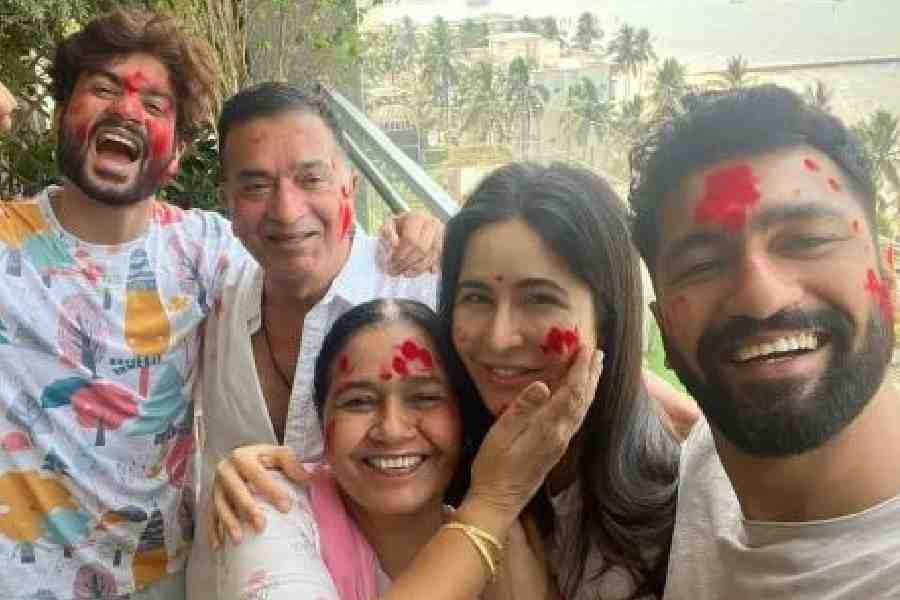
Vicky Kaushal and Katrina Kaif with Vicky’s family
Zeba: You have done some career-defining films, very early. Where does Sam Bahadur fit in?
Vicky: Sam Bahadur has to be the toughest because of the sheer responsibility of playing that character and also the work that went in, not just from myself but the entire team. I am so glad that it was Meghna who was the captain of the ship. She is like the most studious and serious student who has done her homework very meticulously. She was very particular about each and every badge, medal, uniform, button, shoelace, the haircut, the style of the moustache, everything! So, because you are surrounded by a team that’s so particular about the little details because everything has to look very genuine, you feel that if you do your bit well, then everything together will make it look even better.
I am fortunate to have been given the chance to do films which I can be really proud of. Sam Bahadur would be right on top of that list. I can proudly tell the next generation that there was a man like Sam Bahadur and I was the actor who got to play him!
Priyanka: What kind of a voice does Meghna bring to this film which is uniquely hers?
Vicky: There’s an interview of Sam where his grandson is interviewing him, and he asks him what according to Sam, his own biggest achievement is. He replied that in the 40 years of his career as an Army official, he had never punished anyone. That compassion, that heart, is what Meghna brings to an army film, a war film or a biopic, whichever term is apt for this film. In every scene, Meghna would concentrate on that warm heart of his when she would direct me.
Farah: From the clean-shaven boy in Masaan to the blue-haired DJ in Manmarziyaan, from the thin moustache in Raazi to the Sardar Udham look to the tapori look in Govinda Naam Mera, we have seen you embrace a wide variety of looks on screen. How much does costume, make-up and prosthetics aid you in slipping into a character?
Vicky: It helps me a lot. The geography helps me a lot, the location helps me a lot, and what I’m wearing, how I am looking, that helps me a lot. For Sam Manekshaw, as a ritual, I would get ready in the van and just sit and stare at myself in the mirror and tell myself: ‘You are not going to try and be Sam, this is Sam. This person in the mirror is Sam.’ He was very fond of jazz music aur maine zindagi mein kabhi nahin suna tha. But now, I have a jazz playlist and I know of a lot of jazz music. So, before shoot for at least 15 minutes I would play a lot of jazz music, there was a playlist that I had created. And I would walk out of the van being Sam. It was a meditative time for me, and that came with seeing the whole look in the mirror, the uniform, the eyes, the moustache... all of that put together in totality just gives you the help to believe you are that character.
Before that, of course, you are in the process and the headspace that mujhe yeh karna hai. But once you wear your costume, you can have this little meditative process that is very subjective to actors. For me at least, that’s when I start to say that now I am that person.
Pramita: Talking about looks, what’s with the full beard? Have you taken No Shave November very seriously?
Vicky: Why have I become a bear?! (Laughs) This is not laziness. This is for a film that I am shooting now called Chaava; it’s based on Chhatrapati Sambhaji Maharaj, who was Chhatrapati Shivaji Maharaj’s son.
Zeba: We know that you are very family-oriented. How does your family take your successes and misses? And how does their opinion influence you?
Vicky: Their opinions always matter a lot to me because they give me a lot of confidence and a lot of stability. They say: ‘Yaar, jo mann mein aaye, jo achha lage woh karo.’ We don’t sit and have a group discussion that yeh script hain, karoon ya na karoon? Agar woh discussion hota bhi hain, toh the end line is the same: ‘Khaana kha aur so jaa. Subah uth ke Bhagwan ka naam le aur jo sahi lage woh kar de.’ They’re very basic on that front and that confidence gives me a lot of grounding.
As far as hits and misses are concerned, they are like: ‘Haan, chal gayi bahut achha.’ And if it isn’t, it’s okay and we are on to the next discussion. It is not like success is celebrated too much or a failure creates too much sorrow in the house. But my mom and dad say that they have to watch every film at least thrice, so that they can concentrate on the movie. Pehle do teen dafaa they’re just focused on me on the screen and my character!
Priyanka: Do you keep a close track of the box-office performance of your films? Katrina is known to be very well versed with the business side of cinema...
Vicky: That is one thing that comes with a lot of experience. I have just started understanding these things. Earlier, I would just be happy with the opportunities that came my way. How much money those opportunities would make usmein dimaag nahin jaata tha. Mujhe mauka mil gaye apna kaam dikhane ka aur main uss pe focused tha.
But now, of course, because it’s show business, you do want that if a producer has spent so much money on a film, he should profit out of it. Box office matters a lot, but at the end of the day, what gives you peace of mind is that people should resonate with the film. These days, if people resonate with a film, it does the numbers and if they don’t resonate with it, then it doesn’t do the numbers.
Piya: If you had to make a showreel of your best moments so far on screen, what would you put in?
Vicky: I self-indulge a lot. Poori poori picture laga doon main! (Laughs) It would include some snippets from Masaan, for sure... the balloon sequence and the ‘yeh dukh kaahe khatam nahin hota’ scenes. Then the sequence between me and Alia (Bhatt) in Raazi where he (Vicky’s character Iqbal) finds out that she’s a spy... I thought that was some great writing. In Sardar Udham, the whole Jallianwala Bagh sequence is one of the most landmark ones for me as an actor. It was something else only, especially the whole opportunity to work with Shoojitda (Sircar).
I remember the day before I started shooting for Manmarziyaan vividly. We actually got the narration of the film a day before we started shooting. Maine baal neele kar liye thhe by then. He (director Anurag Kashyap) just said: “Tu baal neele kar le aur Amritsar aa jaa.’ I knew that it is a love triangle, I knew that (the character) was this carefree guy and a DJ. But I didn’t know what the dialogues were, what I was supposed to do. The night before the shoot, I got very scared that I didn’t know anything about the film and I had also coloured my hair, which meant I wouldn’t get any other work as an actor! (Laughs)
But that film taught me the most as an actor. Anurag sir just said: ‘Trust me, you just be the character.’ And that’s what I told myself. I decided to go and have fun and surrender myself fully. That changed the game for me for all my future films. I learnt that I just have to empty myself, come and start learning again and that just really helped me. That film will be very special. There are many moments in Sam Bahadur also but I will talk to you about that after the film releases.
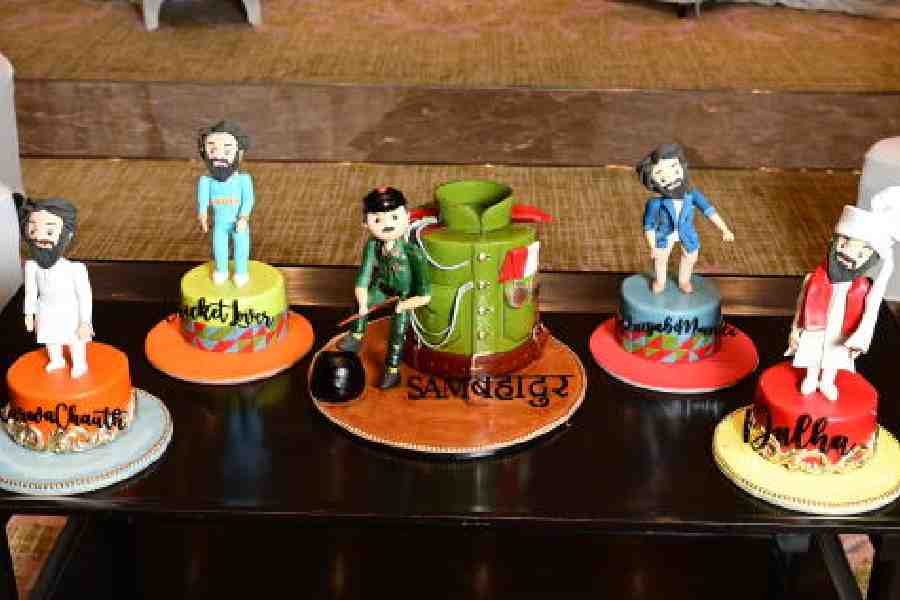
The series of cakes were made by Little Pleasures Patisserie. The central cake had a fondant figure of Sam Manekshaw, who Vicky Kaushal plays in Sam Bahadur, and was in tune with the colours of the Indian Army. Four other cakes depicted the different moods and avatars of the actor’s life. The first one was from his wedding with Katrina Kaif where he exuded dulha vibes. There was another figure of him in a white kurta and pyjama from Karva Chauth this year. Cricket fanatic Vicky was depicted by a figure of him wearing the Indian jersey and ‘bleeding blue’ while the Punjabi munda who likes grooving to desi music was shown in a blue blazer taken from his Instagram video where he is seen dancing to a popular Punjabi number
Farah: What does a chill day look like for you?
Vicky: Lots of sleep! I have no limit and that can be the whole day! Generally, I wake up by the afternoon. Then araam se I watch TV with Katrina, have good food, where there is no dieting, nothing. Music chalata hoon, TV dekhta hoon. Then by 8 in the evening, I am like: ‘Haan, ab kuch karte hain!’ (Laughs) After that, I catch up with some old friends jinko main nahin mil paata hoon. We make a plan together that chalo yaar, ghar pe aa jao, let’s chill together. Lekin mujhe koi mehnat nahin karni hain on chill days.
Zeba: You are a typical Punjabi munda who loves vibing to Punjabi music. What is it about Punjabi songs that you love so much and what are you tripping on now?
Vicky: Punjabi music has been a part of me since I was in school. Sunny, my brother, and I would lock ourselves in the bedroom and dance to loud music. Back in the day, we didn’t have streaming and Internet and could only get music on cassettes and CDs. During every summer vacation, we would go to our native village in Punjab and our biggest thrill of going there would be to visit a dhaba there where a munda would sell a compilation of the biggest Punjabi hits of the year! (Laughs) At that time, that kind of music, because there was no Internet, would not reach Bombay. We would only get it in Punjab.
So Sunny and I would be like: ‘Ki yaar wahan abhi tak gaye nahi hain aur woh CD nahi liye.’ Those were the kinds jo burn karte thhe computer pe aur fir pachaas-sau gaane hote thhe and we would keep listening to it for one whole month.
Punjabi songs are part of my DNA and just put me in a good mood. Even now, I wake up and put on Punjabi music while having breakfast.... There are some amazing artistes that have really come up... there’s Karan Aujla, there’s Diljit (Dosanjh). I love Gurdas Maan saab... he’s a legend.
Priyanka: Has Katrina developed a taste for Punjabi music?
Vicky: Yeah, a little bit. She doesn’t mind (laughs). She enjoys it sometimes. At least I have managed to convert her gym playlist (to Punjabi music). Full energy!
HIS INSTAGRAM, HIS STORY
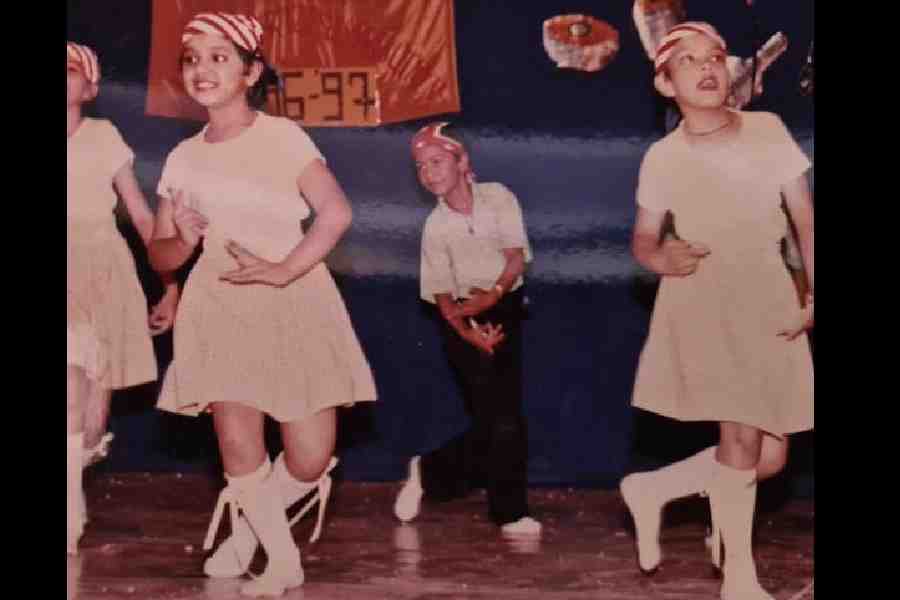
I would take part in every annual day dance competition in school. I danced a lot on stage. This was my favourite shirt — it was fluorescent green — black pants and bandana. I remember the names of all these guys in the picture. sweet days, man. This was just like... It was fun. It was a lot of fun.
Actually, the first time I was on stage for a school annual day, my pant belt had come off and it was just falling!. The first performance was legendary and this was the second.
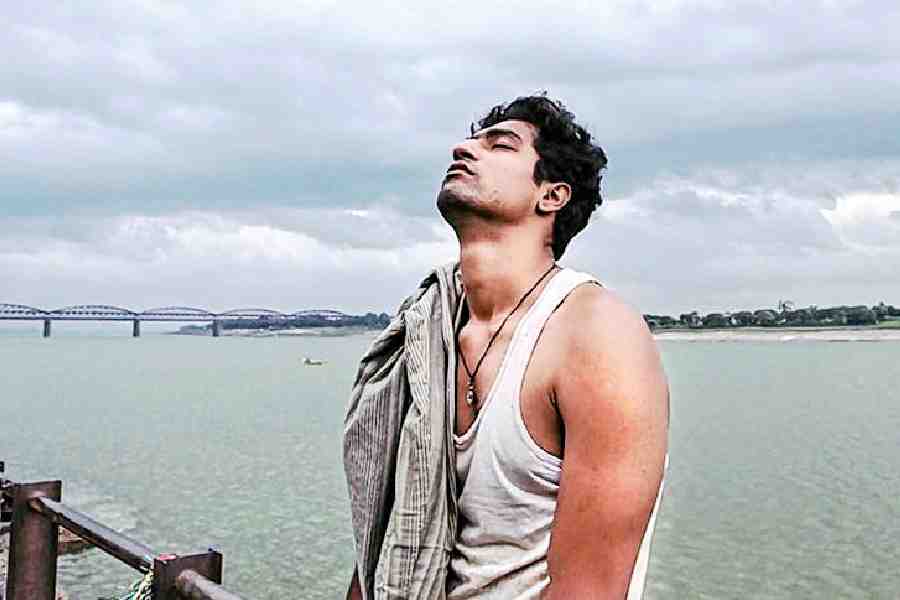
My most favourite days on a film set were on Masaan because there was no fear. It was like a college project. We didn’t even know if the film would eventually come out. We were just making it and we were happy that we were getting a chance. We were making it in such poverty! You remember the opening sequence of Richa Chadha when she’s gone to a lodge with her boyfriend? We were staying in that lodge! That was my co-star Shweta Tripathi’s room! Apart from Richa and Sanjay sir (Sanjay Mishra), Masaan was everybody’s first film. It was very special, like do whatever you feel like, do whatever you feel good about. No tension!
On the first day, we had a steadicam for our shoot and we thought we were making Avatar! (Laughs) On that day we decided that no one would sit and act, everyone would walk!
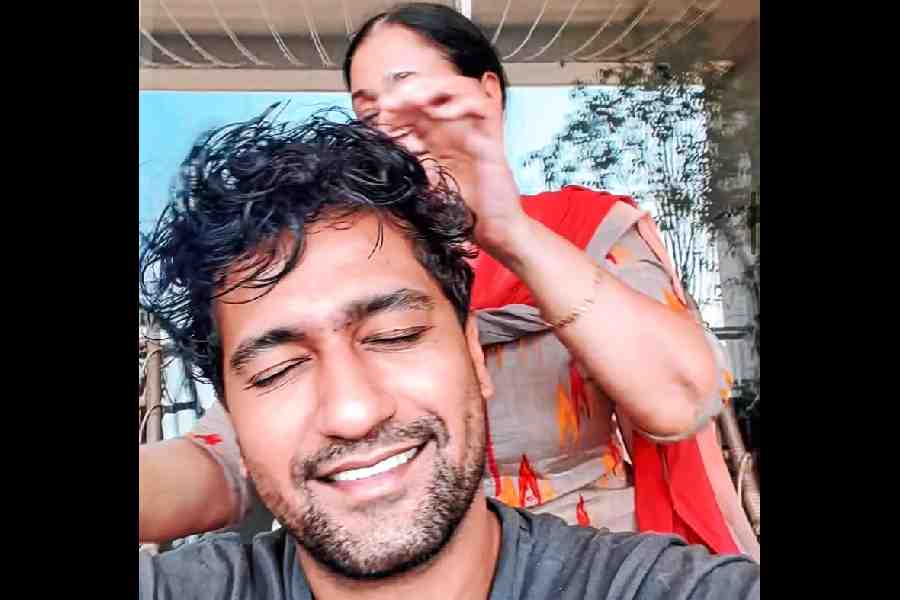
This is emotion, this is peace. I haven’t been able to do this in a long time. I hate to give champi, but I love taking it!
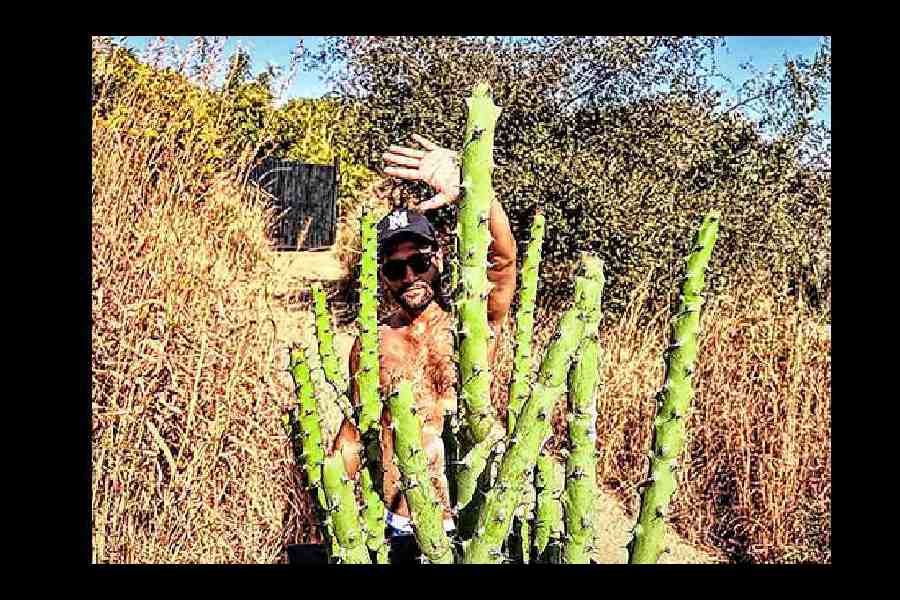
This is last year during Christmas when Katrina and I had made a trip to Rajasthan. This is a beautiful property two hours away from Jaipur.
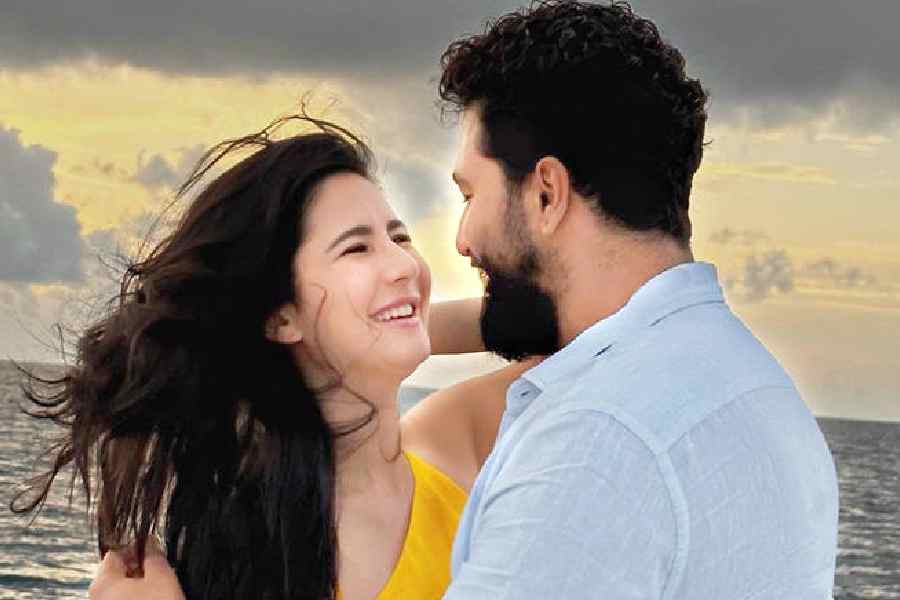
We had gone to the Maldives with a group of friends for Katrina’s birthday. It was a beautiful sunset and we spent it together. I am a mountain person and she’s a sea person.

